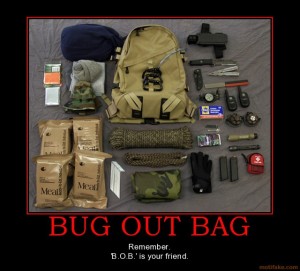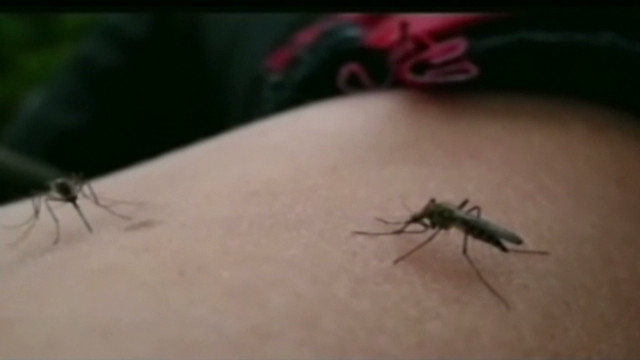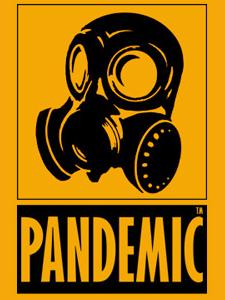Tag Archives: outbreak
Kansas militia expects zombies, and it’s dead serious
It’s got to be one of the coolest names ever for a group:
The Kansas Anti Zombie Militia.
But the group is real and its members are pretty serious about it.
Once the Zombie Apocalypse hits, they’ll be ready for it and they want you to be too.
“Can a natural person change into this monster that many fear?” Alfredo Carbajal, the militia’s main spokesman, said in an interview. “The possibilities are yes, it can happen. We have seen incidents that are very close to it, and we are thinking it is more possible than people think.”
Carbajal and other true believers aren’t so much scared of movie zombies. The apocalypse they see coming is a pandemic spread by a virus that creates zombie-like symptoms.
Last month, the Discovery Channel featured the Kansas militia in a documentary that concluded that such a Zombie Apocalypse — or Zompoc — was possible. The program featured scientists who speculated some evolving virus is bound to jump to humans on our overcrowded planet.
Of course, scientists have been warning about pandemics such as bird flu that don’t produce zombies, but zombies are the hot monsters right now.
A packed house listened last year at St. Mary’s College of Maryland as a chemist, psychologist and student acknowledged the possibility of an epidemic, according to the school’s newspaper.
The panel pointed out that there already have been zombie-like symptoms dating back to 1594; they were eventually determined to be the first recorded human case of furious rabies — an especially serious form of rabies.
Carbajal, 28, didn’t start out as a zombie fighter.
He and several friends grew up in Wamego, home of the Oz museum, watching zombie movies like “Shaun of the Dead,” “28 Days Later” and “Night of the Living Dead” and playing video games like the Left 4 Dead video game series.
The friends designed a web page for fun but then they began wondering what to do if there was actually a zompoc, and their thinking turned serious.
The group has five founders but about 1,500 likes on its Facebook page.
It’s not all zombie crusading; the militia also sponsors a Zombie Walk in October to raise money and food for charities.
But the group’s website points out that the militia is committed to research and preparing for a zompoc.
“We are not crazy. We are not paranoid. We believe in preparedness in any situation,” it says.
Everything you need to know about surviving a zombie attack can be found on the militia’s website — never take on a small horde of zombies by yourself because that would be suicide, and make sure all your skin is covered because blood spatters can be infectious.
Blunt objects are better to use than, say, knives because blades tend to dull after each use. A metal bat and a collapsible baton are the two most recommended weapons.
The site also notes as “a real-life threat to humanity” a biosecurity lab planned near Manhattan, Kan.
Carbajal and his group are not alone in their deep fascination over zombies. Much of the country has been touched.
The “Walking Dead” cable series broke basic cable ratings records with more than 10 million viewers for the first show of season three. And already hype for a movie, based on the book “World War Z,” is widespread even though its release date is six months out.
How-to books have been published in recent years, including the “Zombie Survival Guide,” which made the New York Times Best Seller List, and the “Zombie Combat Manual,” which warns “During a zombie outbreak, 98% of individuals will have to destroy an undead opponent without the aid of a firearm. Will you be ready?”
Carbajal said that if you aren’t a true believer, just being prepared for any apocalypse or natural disaster is a good thing.
“My thought is if you are ready for zombies, you are ready for anything, whether it be natural disasters, fall of government, invasion from another country — the possibilities are endless,” he said. “The point is to keep yourself and your loved ones safe.”
Others agree.
Using the guise of a zombie apocalypse, the Centers for Disease Control and Prevention and state emergency management agencies are trying to get people to be prepared for a natural disaster with at least several days of food and supplies, copies of important documents and a plan.
“It’s a spoof; we are not encouraging a zombie scare,” said Devan Tucking-Strickler, Kansas Division of Emergency Management spokeswoman. “We use the tagline, ‘If you are prepared for zombies, you are prepared for anything and prepared for the unexpected.’ ”
Kansas even used the militia to help promote general disaster awareness.
Members of the group were featured in a photograph with Gov. Sam Brownback when he signed a proclamation declaring October as Zombie Preparedness Month in Kansas.
A little preparation for disaster can prove very important later, but most people don’t prepare, said another viral disaster worrier, Shawn Beatty, who also was featured on the Discovery documentary.
“You can get a first aid kit for $100, something that you should have in your house anyway, or you can go to dinner, take a trip, or have a really nice night out with that $100,” said Beatty, a public-school teacher in Columbia. “Who is going to say, ‘Let’s go buy something that you may not use?’
Dept. of Homeland Security Warns of Impending Zombie Apocalypse
 If there’s one thing Americans love, it’s the zombie apocalypse. I don’t know why, really. Although some people think that it would be cool to blow the heads off the undead and attempt to survive in a brutal post-apocalyptic landscape, most people would get their fat asses either gnawed on by zombies or shot by a survivalist looking for supplies. The harsh reality is that most people wouldn’t survive the zombie apocalypse, but we can keep dreaming that we’re the exception – we’re all Rick from The Walking Dead.
If there’s one thing Americans love, it’s the zombie apocalypse. I don’t know why, really. Although some people think that it would be cool to blow the heads off the undead and attempt to survive in a brutal post-apocalyptic landscape, most people would get their fat asses either gnawed on by zombies or shot by a survivalist looking for supplies. The harsh reality is that most people wouldn’t survive the zombie apocalypse, but we can keep dreaming that we’re the exception – we’re all Rick from The Walking Dead.
This month is National Preparedness Month, and the Department of Homeland Security is capitalizing on the never-ending zombie craze to make people start thinking about what they would do in the event of a disaster.
According to the AP, DHS is urging citizens to prepare for the zombie apocalypse. “The Zombies are coming!” they say.
Except they’re not. At least not right now. DHS’s message is that if you’re prepared for a zombie attack, you’ll likely be prepared for a hurricane, pandemic, earthquake, or terrorist attack. That’s because all of those events have something in common – the need for shelter, food, water, etc. DHS wants emergency planners across the country to use the “zombie attack” trope to get people into the disaster preparedness mindset.
Of course, this isn’t the first time that a government organization has mentioned the z word to citizens. Last year, the Centers for Disease Control actually acknowledged zombies and released their own zombie preparedness guide.
Here’s what the CDC says would happen, on a governmental response level:
If zombies did start roaming the streets, CDC would conduct an investigation much like any other disease outbreak. CDC would provide technical assistance to cities, states, or international partners dealing with a zombie infestation. This assistance might include consultation, lab testing and analysis, patient management and care, tracking of contacts, and infection control (including isolation and quarantine).
It’s likely that an investigation of this scenario would seek to accomplish several goals: determine the cause of the illness, the source of the infection/virus/toxin, learn how it is transmitted and how readily it is spread, how to break the cycle of transmission and thus prevent further cases, and how patients can best be treated. Not only would scientists be working to identify the cause and cure of the zombie outbreak, but CDC and other federal agencies would send medical teams and first responders to help those in affected areas (I will be volunteering the young nameless disease detectives for the field work).
Even though the CDC clearly has a plan, they officially denied the known existence of zombies after a rash of cannibalism stories hit the news earlier this year.
If you have the money and truly wish to prepare for the zombie apocalypse, you can’t go wrong with this kit for the 1%.
AND MAN SHALL FALL! West Nile cases rising; 66 dead

(CNN) — Sixty-six people have died from West Nile virus infections this year, and the number of human cases has grown to 1,590, the U.S. Centers for Disease Control and Prevention said Wednesday.
That’s the highest case count through the last week of August since the virus was first detected in the United States in 1999.
Nearly half of all the infections have occurred in Texas, where officials said later Wednesday that 894 cases have been reported along with 34 deaths.
“Those numbers are going to go up,” said Dr. David Lakey, commissioner for the Texas Department of State Health Services.
Lakey said it looks like 2012 will be the worst year so far when it comes to West Nile virus cases. In 2003, Texas reported 40 deaths because of the virus, and health officials believe they will surpass that number this year.
All lower 48 states are now reporting West Nile activity, and 43 states have reported at least one person infected with the virus.
More than 70% of all West Nile virus cases in the United States are found in six states: Texas, South Dakota, Mississippi, Oklahoma, Louisiana and Michigan, according to the CDC.
While the CDC said these are the highest number of cases reported by the last week in August since the disease was first recorded in 1999, it’s not the highest number the country has seen. In 2003, the United States had 9,862 reported cases of West Nile virus, and in 2002 there were more than 4,100 cases and 284 fatalities.
In more than half the current nationwide cases, West Nile has led to neuroinvasive disease — serious illnesses like meningitis, encephalitis or virus-associated paralysis. About 10% of these cases can be fatal, according to the CDC, and a high proportion of those who survive can be left with longstanding neurological problems.
Older people are more vulnerable to severe illness from West Nile. So far, the median age among those with neuroinvasive disease this year is 58. In Texas, nearly two-thirds of all cases are in people older than 50.
Health officials do not yet know why there are more cases this year than in recent years.
Based on previous experiences with floods and hurricanes, health officials do not believe Hurricane Isaac will have a major impact on this year’s outbreak.
Mosquitoes that spread the virus breed in small nutrient-rich pools of water, such as the water found in old tires, so a large rainfall event or flooding usually washes out those small pools and eliminates breeding sites, said Dr. Lyle Petersen, who heads the CDC’s Division of Vector-Borne Infections.
But after the water recedes, there’s always the possibility that new small pools of water will form.
Petersen urged the public to take proper precautions to prevent getting sick regardless of whether they live in a state with high or low case counts.
To reduce your risk of exposure to mosquitoes and to prevent their breeding sites:
— Drain all standing water from flower pots, old tires, clogged rain gutters, etc., where mosquitoes breed.
— Use an insect repellant that contains DEET, picaridin or oil of lemon eucalyptus.
— Also wear long sleeves and long pants to protect your skin when you’re outside.
— Stay indoors at dusk and dawn because that’s when mosquitoes are most active.
